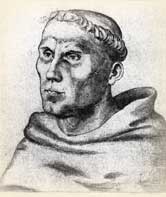
Since your majesty and your lordships desire a simple reply, I will
answer without horns and without teeth. Unless I am convicted by
scripture and plain reason--I do not accept the authority of popes and
councils for they have contradicted each other--my conscience is
captive to the Word of God. I cannot and I will not recant anything,
for to go against conscience is neither right nor safe. Here I stand, I
cannot do otherwise, God help me. Amen."
Perhaps the most notable words spoken in the Reformation, this
according to early printed reports, was Luther's reply at Worms when
urged to recant. He uttered the memorable lines in German
on this day, April 18, 1521, and then, upon
request, repeated their gist in Latin for those who did not understand
his native tongue. He was sweating, said witnesses. With a victory
gesture he slipped out of the room.
Frederick the Wise, Luther's supporter was uneasy. Did the
scriptures condemn Luther or not? "He is too daring for me,"
the elector admitted. Nonetheless, on the next day, when asked to stand
against Luther with the emperor, he did not sign the condemnation
although the other four electors did so.
As for the Emperor, he reasoned that a single friar who went
contrary to the whole church could not possibly be right. Descended
from a long line of Christian emperors, he felt that to accept Luther's
view was to betray the faith of his fathers. He would take prompt
action against Luther, he vowed. But since Luther had been given safe
conduct to Worms, he allowed him to depart in safety.
Luther did not leave Worms at once. For several days a committee
reasoned with him, begging him not to rend the church in two. They
pointed out that war would surely come to Germany. Melanchthon, his
beloved associate, might be killed. Luther could not help but be moved,
but his determination held. God's word must be followed whatever the
cost. To this confrontation his stand against indulgences had finally
brought him.
There are grounds to doubt that Luther said "Here I stand. I
cannot do otherwise." Although the earliest printed versions
contain these lines, the official transcripts do not. Whether spoken or
not, the words convey the brave monk's attitude. When Luther left
Worms, the Reformation was irrevocable.
Martin Luther was at his noblest at Worms. His bold words have
stirred men's imagination through subsequent centuries, for they have
the same ring to them as Peter's famous defiance of the Sanhedrin.
"Judge for yourselves whether we ought to obey God or
men."
Bibliography:
- Bainton, Roland H. Here I Stand; A life of
Martin Luther. New York: mentor, 1950.
- Durant, Will. The Reformation. New York: Simon and
Schuster, 1957.
- Ganns, H. G. "Luther, Martin." The Catholic
Encyclopedia. New York: Robert Appleton, 1914.
- George, Timothy. "Luther, Martin." Biographical
Dictionary of Evangelicals. Timothy Larsen, editor. Downers-Grove,
Illinois: Intevarsity Press, 2003.
- "Luther, Martin." The Oxford Dictionary of the
Christian Church. Edited by F. L. Cross and E. A. Livingstone.
Oxford, 1997.
Read this article at - http://www.christianity.com/church/church-history/timeline/1501-1600/martin-luthers-most-noble-words-11629925.html
 Since your majesty and your lordships desire a simple reply, I will
answer without horns and without teeth. Unless I am convicted by
scripture and plain reason--I do not accept the authority of popes and
councils for they have contradicted each other--my conscience is
captive to the Word of God. I cannot and I will not recant anything,
for to go against conscience is neither right nor safe. Here I stand, I
cannot do otherwise, God help me. Amen."
Since your majesty and your lordships desire a simple reply, I will
answer without horns and without teeth. Unless I am convicted by
scripture and plain reason--I do not accept the authority of popes and
councils for they have contradicted each other--my conscience is
captive to the Word of God. I cannot and I will not recant anything,
for to go against conscience is neither right nor safe. Here I stand, I
cannot do otherwise, God help me. Amen."
Comments 0